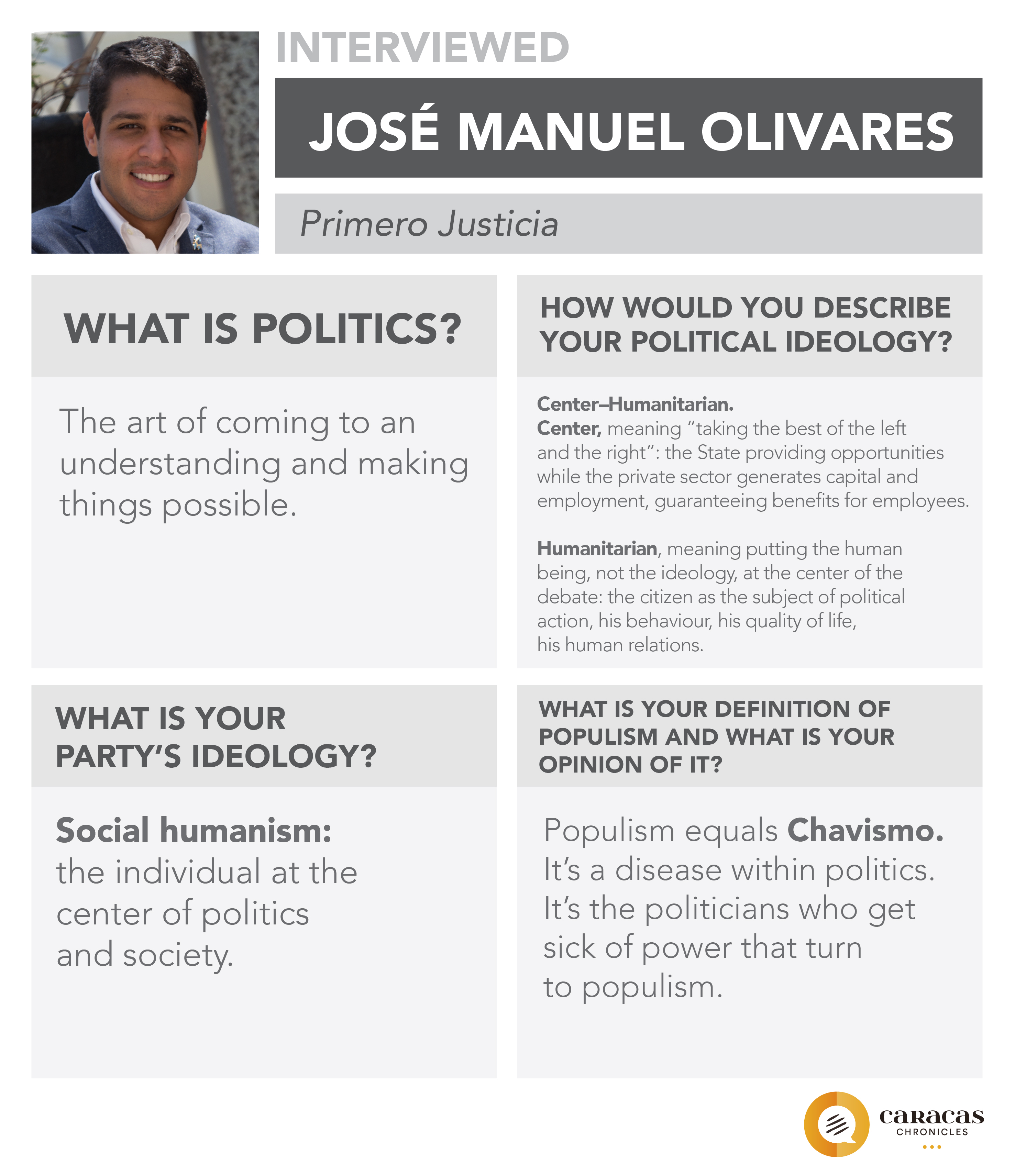Caracas Chronicles’ Young Politicians Series: José Manuel Olivares
José Manuel Olivares from Primero Justicia, is a young MD and deputy leading the Committee on Social Development. He was one of the first people to warn everyone about the health crisis and actively works for a better health model for all Venezuelans.


Photo: Daniel Lara
José Manuel Olivares is a young doctor (MD) specialized in oncology, radiotherapy and nuclear medicine. Elected in 2015 as deputy for Vargas in Venezuela’s “opposition majority” National Assembly, he’s currently Chairman of the Committee on Social Development. He considers being one of the early whistleblowers on the current humanitarian crisis as one of his great achievements, sponsoring the Special Law to Address the National Health Crisis. “I was able to bring what I saw my patients suffer to the National Assembly, give the crisis a face, make it visible.”
 The role of the politician in a crisis like this is to create consensus, generate understanding, build bridges and generate solutions; not emigrate
The role of the politician in a crisis like this is to create consensus, generate understanding, build bridges and generate solutions; not emigrate
José Manuel wants to keep uniting his two passions, medicine and politics. He has been working on the construction of a Health Model, putting together the bill that he hopes will reform the Health Law. He says that in the short-term, they’re working on what to do when the government changes, “what will the 10, 20 or 100 impact measures that will solve the most important issues as soon as there’s a change towards democracy be.”
In fact, with the opposition in power, he’d like to contribute as Health Minister, working on the problems he has spent years denouncing. That would imply the complete reform of the health system, from ending corruption to allowing humanitarian aid, raising the health workers’ salaries and reinvesting in technology and infrastructure. He’d also like to abolish “operativos”; the access to healthcare should be guaranteed, especially through education and prevention.
And he wants to eliminate that age-old practice of politicians inaugurating health facilities.
The first issue we need to solve is the economy; you cannot start with social issues without having resources
If he were president today, deputy Olivares would first focus on the economy, taking all the necessary measures to return value to the bolivar, reactivate investment and generate jobs. At the same time, he’d work on providing social, political and personal security which in turn will give you the framework to create a good model of health (among other things), which necessarily involves independent branches of power.
We have to reform, educate and bring back respect and admiration towards police bodies
As for security, Olivares thinks that the solution comes through education. Fixing crime is not solely about police repression, there’s endowment, the use of technology and the education of the citizens, the institutions and a complete security network where everyone’s a component in the solution. The construction of prisons can fix present overcrowding —Olivares underscores, however, that it’s not a solution unless procedural delay is fixed as well, and that goes through fixing the whole legal system and achieving independence between branches of government.
José Manuel also considers that civil rights are not being talked about, but are being worked on. While working on the most urgent issue (the crisis burning down the country) is what’s most visible, he believes civil rights to be important. From adoption, abortion, gender issues, to same-sex marriage and sexual diversity (which are on the global agenda), these are subjects discussed in the National Assembly. There have been innovative laws for certain situations, but they haven’t been given a priority given the urgency of other problems. He believes there’s a lot of work to be done, though, so that “when this country changes, we won’t be so far behind in today’s vanguard issues.”
All crises have to generate a talk to end them, we can call it dialogue, negotiation or conversation, but it can never be ruled out in politics
Deputy Olivares doesn’t pretend to know how this crisis will end, but he’s an advocate of peaceful and electoral solutions to Venezuela.
You can have a conversation without declining your principles and values, he says, bringing up both the examples of South Africa and Chile. The defining characteristic that allowed these transitions was the presence of a protection mechanism for a portion of the outgoing regime, avoiding vengeance and delaying justice, which included De Klerk as Mandela’s vice president in South Africa and Augusto Pinochet as Commander in chief after his ousting. This provides an orderly transition and the possibility of change.
Today, the balance is tipped by the military
Olivares considers that the regime has made an explicit decision to close the electoral route, because it knows that it’ll lose power with legitimate elections. “The change can be electoral, we are fighting to make it so.” In fact, Olivares thinks that the only thing keeping the government in power is the armed forces.
He believes that to reestablish balance in the country (once there’s a change in the actual regime), there must be a discussion on reform. There could be a legitimate constituent assembly, not necessarily to change the Constitution, but maybe to amend the indefinite reelection clause. There should also be a debate on refunding all public powers, removing vices and starting from scratch to choose independent powers that are now sequestered by a political sector.
“This National Assembly doesn’t have powers now to appoint authorities whose terms have not expired, because they were already chosen and it was our mistake, since we didn’t participate in the 2005 elections.”
Caracas Chronicles is 100% reader-supported.
We’ve been able to hang on for 21 years in one of the craziest media landscapes in the world. We’ve seen different media outlets in Venezuela (and abroad) closing shop, something we’re looking to avoid at all costs. Your collaboration goes a long way in helping us weather the storm.
Donate



